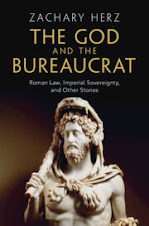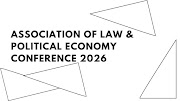Tijdschrift voor Rechtsgeschiedenis/Revue d'histoire du droit/The Legal History Review 93:1-2 (2025) has been published. H/t: ESCLH
Indefensio and procedural resistance within and without the
edictum perpetuum by Adrian Häusler
Lenel’s alleged edicts ut oportet non defendit have significantly influenced our understanding of the consequences of indefensio. Yet, this paper challenges the reality of these edictal provisions. Addressing what might be considered as a legal gap, the praetor’s prerogatives on indefensio both within and beyond the edictum perpetuum are comprehensively reassessed. It is concluded that the praetor regulated indefensio in his edict opportunistically, primarily to resolve complex situations of indefensio. In cases not covered by the edict, the praetor relied on his powers derived from iurisdictio and imperium to impose appropriate measures against the indefensus.
Eusebius of Caesarea on Constantine the good shepherd: constructing the Christian
basileus and lawgiver by Francesco Rotiroti
The present article is the second in a diptych looking at the pastoral characterisation of Constantine in the works of Eusebius of Caesarea through the lens of institutional theory. Through pastoral discourse, I argue, Eusebius systematises key elements of the policy and functions of the first Christian emperor, thus contributing to the institutional construction of the early Christian basileia. It is an early attempt to ask, and answer, what would become a central question of Christendom: what has a Christian prince to do with religion and the church? Established by God and an earthly image of the pastoral functions of Christ, Eusebius’ shepherd-basileus is in a privileged position to perform the traditional functions of the metaphorical shepherd, including that of procuring the salvation of the flock through moral instruction and the knowledge of God. Applied to a Roman emperor, this means the establishment of norms of conduct and the true religion through the law.
The emperor’s trees by Francesco Bono
The essay aims to subject two constitutions, C. 11,78,1 and 2, to a new analysis in order to fully understand their content and to verify their importance for the reconstruction of the use and exploitation of the forest areas under the jurisdiction of the emperor.
Laws in the making: the feudal and penal charters of Hainaut (28 July 1200) by Nicolas Ruffini-Ronzani
This article deals with two important legal texts commonly attributed to the hand of Gislebert of Mons, author of the Chronicon Hanoniense and key-player at the chancery of Hainaut at the end of the twelfth century. Commonly known as the ‘legal’ and ‘feudal’ charters of Hainaut, these two documents were enacted by Count Baldwin vi at the castle of Mons in July 1200 and formed the basis of the legislation in Hainaut in the following centuries. The article investigates the writing process of these documents from the perspectives of palaeography and diplomatics. It demonstrates that Gislebert was not the author of these charters. By studying the content of the laws, the article establishes then that they were promulgated in order to solve problems relating to the inheritance of the comital power. The enforcement of the laws is being questioned in the last part of the paper, which examines their numerous Latin and French copies.
Legal pluralism that wasn’t: State and the plurality of law in late medieval and early modern Europe by Marie Seong-Hak Kim
Legal pluralism has seemingly become a new orthodoxy. Its core proposition is that law has no privileged relationship with the state. Students of legal history have reason for paying attention, as legal pluralism, a corollary of colonialism, has come to project back onto European history its cultural and social-scientific paradigm and arrogate to itself the role of explaining the evolution of normative orders in the continent’s past. This article argues that applying to European history a theory premised on a contest between legal monism and pluralism brings more confusion than clarity. The difference between historically grounded legal pluralism and the contemporary theory of legal pluralism revolves around the question of whether multiple legal orders existed as part of state law or state law was merely one among many legal orders. In late medieval and early modern Europe, law was foremost equated with jurisdictional power, that is, authority to rule. Various kinds of laws, including custom, Roman law, church law, and legislation, operated in a plurality of practices within the state-centered hierarchy, and it was on this framework of state law pluralism that the European countries, while remaining under the doctrinal unity of the jus commune, each followed a discrete path of legal development shaped by political and institutional changes. The history of Europe provides little support for the theory that an imposed Romanitas or state sovereignty displaced and distorted good old customary law. Modern legal pluralist views may be in need of reconsideration not just in light of what was happening in late medieval and early modern Europe but also in terms of how Europe’s ideas of legal order spread to the colonies in the late nineteenth century. Recent debates on legal pluralism serve as a reminder that history is distinct from an anemic version of the more theoretical social sciences. Still, the binary of unity and plurality in law can offer an unaccustomed yet useful direction in approaching the legal past.
A new fragment of the 15th century Frisian Excerpta Legum tradition Edition, translation, and commentary by Hylkje de Jong - Han Nijdam - Marvin Wiegand
This article contains an edition, translation and commentary of an Old Frisian text which forms part of a larger complex which was discovered last year in the National Library of Austria. It concerns a small collection of so-called Excerpta Legum material, dating from the 15th century. This tradition arose in the modern province of Fryslân shortly after 1400. It showed a massive reception of Canon and Roman law into Frisian indigenous law. The five paragraphs of the text edited here are compared to the larger tradition that has been handed down. This small collection yields some interesting insights into its development.
‘To the great advantage of skippers’: on
compacten, or mutual marine insurances, in early modern Friesland by Delphine Sirks
During the seventeenth and eighteenth centuries, mutual marine insurances between skippers, known as compacten, emerged throughout Friesland, both in villages and in cities. Outlining the legal settings of twelve compacten by discussing the organization of these compacten, the risks insured against, the financial set-ups and other noteworthy clauses, the overall view is that these mutual insurances offered Frisian skippers and shipowners a risk mitigation system that was able to support their specific, local needs.
Building the law: law-making and lobbying in Belgium’s construction sector (c. 1890 – c. 1940) by Simon De Nys-Ketels & Dave De ruysscher
This article zooms in on the legal activities of the Société Centrale d’Architecture en Belgique in the Belle Époque and Interbellum, analyzing the ways in which professional interest groups without a legal background could impact processes of law-making. scab developed publications for professionals and invested in strategic networking and in-house legal expertise. As a result, it not only became an important centre of information on construction legislation, but also effectively shaped areas of construction law, such as those concerning the arbitration of building conflicts, the architect’s fee, and the legal recognition of the title of architect.
Review EssayOn the nature of Roman imperial legislation and codifications: a reaction to a recent approach by A.J.B. Sirks
Roman legislation was generally a reaction to events, but that does not mean that if encapsulated in a codification, similar events had to have happened to justify its inclusion (it would be impossible for an entire code). A legal rule purports to cover future similar cases and only if these do not present themselves for a long period, the rule goes into abeyance. Further, such rules usually fit an existing legal framework and a codification continues this framework. Hence Justinian’s Code (but already Theodosius’) must be considered as a systematical body. Consequence of this is, that for an analysis of the imperial agrarian policy all texts regarding this must be taken into account, and in as far as gathered in a title, they should be considered as a systematical whole, which implies that the chronology in any title is of no importance. This goes also for the title on the coloni seu agricolis censitis, cj 11,48. Another point is the communicative function of laws. Indeed, notwithstanding that most of them are addressed to a high functionary, the ultimate addressees lie behind that functionary. But in order to know to whom and what was communicated, one best relies on the preambles. Where these are absent, the ultimate addressees can usually only be deduced from the contents of the rule.
Book Reviews
J.E. Lendon, That tyrant, persuasion: How rhetoric shaped the Roman world. Princeton University Press, Princeton 2022. xviii + 302 p. by Tessa Leesen
W.J. Zwalve, Power and authority: A trial of two swords, A history of the Union of the Holy Roman Empire and the Kingdom of Sicily (1186–1250). Eleven, The Hague – Chicago 2023. 631 p. by Rosalba Sorice
Sara Menzinger, Finzioni del diritto medievale. [Ius Ricerche, 8]. Quotlibet, Macerata 2023. 345 S. by Matthias Schmoeckel
J. Althusius, La politique méthodiquement ordonnée et illustrée par des exemples sacrés et profanes, Traduction, introduction et lexique par Gaëlle Demelemestre. [Les Classiques de la pensée politique, 24]. Librairie Droz, Genève 2023. 824 p. by Alain Wijffels
F. Dorssemont, On the artistic representation of industrial disputes in the shadow of repression in European art, From 1870 to 1914 and beyond. [Law and visual jurisprudence, 15]. Springer, Cham (Switzerland) 2024. ix + 210 p. by Georges Martyn
H.-P. Haferkamp and V. Erkkilä (eds.), Socialism and legal history, The histories and historians of law in socialist East Central Europe. [Routledge research in legal history]. Routledge, London 2020. 204 p. by Tomasz Giaro
S. Meder, Savignys Weg in die juristische Moderne: Romantik, Gender, Religion, Wissenschaft. Schwab Verlag, [Berlin 2023]. 477 S. by Boudewijn Sirks
In Memoriam
In memoriam Hugo de Schepper, 1934–2024 by Gustaaf Janssens
A historian of legal thought, a master of legal philology: Kees Bezemer (1951–2024), in memoriam by Emanuele Conte














_by_Robert_Edge_Pine.jpg)






